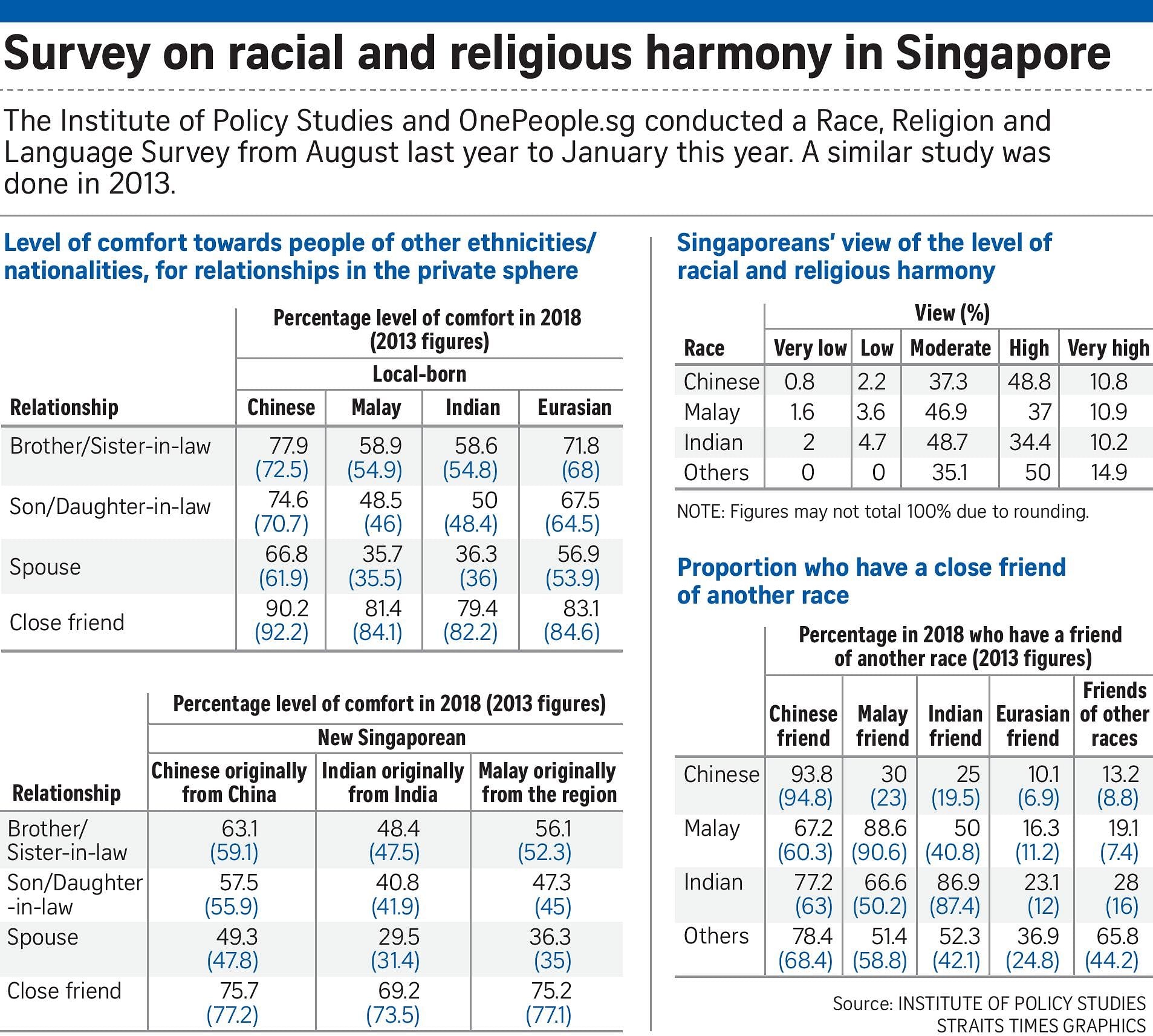IPS-OnePeople.sg study
Racial, religious harmony improving in Singapore: Study
It finds most respondents embrace racial diversity, adopt colour-blindness in social interaction and employment
Sign up now: Get ST's newsletters delivered to your inbox

The researchers noted that younger people may benefit more from the focus on interracial understanding and mixing in schools today.
ST PHOTO: GAVIN FOO
More Singaporeans now have close friends of another race compared with five years ago, and are also more trusting of those from different races or religions.
Interracial and inter-religious harmony in Singapore is improving, based on a survey of citizens and permanent residents last year.
But the survey also revealed an uptick in minority groups perceiving workplace discrimination, like when applying for jobs.
Researchers say this may be due to greater awareness of the presence of discriminatory behaviour in the workplace and how this might have affected some minorities.
The survey findings from a study of race, religion and language carried out by the Institute of Policy Studies (IPS) and racial harmony advocacy group OnePeople.sg were released yesterday.
The results, in general, show Singapore is "faring well" with regard to interracial and inter-religious relations, the researchers said.
"The majority of respondents embrace racial diversity and adopt colour-blindness in the case of social interaction and employment," they noted.

In addition, most, including minorities, perceive little to no discrimination and social exclusion in public spaces here - an important sign of racial and religious harmony, they said.
Researchers polled 4,015 people between August last year and January this year, asking for their views about race and religion in 10 areas. A similar study was done in 2013.
In the 2018 study, researchers found that a higher proportion of Singaporeans have close fri-ends of another race compared with 2013.
Thirty per cent of Chinese respondents had a close Malay friend in 2018, up from 23 per cent in 2013 - an indication of higher levels of racial harmony and interracial interaction, the researchers noted.
Likewise, 77.2 per cent of Indian respondents said they had a close Chinese friend in 2018, up from 63 per cent in 2013.
Fewer people also stereotyped a person based on race, the study found. In 2013, 46.8 per cent of respondents agreed or strongly agreed that race is indicative of another person's views or behaviour. This has dropped to 35.2 per cent.
When asked whether people from a different race or religion could be trusted to help in a national crisis such as a severe acute respiratory syndrome (Sars) outbreak, more said yes.
The study found that between the 2013 and 2018 surveys, trust in all races increased. For instance, 61.3 per cent of respondents trust "all or mostly all", or "more than half" of, Singapore Malays to help in a crisis, up from 52.7 per cent previously. In a similar vein, 63.1 per cent of respondents said they could trust Singapore Indians to help in a crisis, up from 54.1 per cent.
In a crisis, trust in those from other religions - Buddhism, Taoism, Islam, Christianity and Hinduism - or those without religion was also higher in the latest poll.
More than 59 per cent of respondents said they could trust either "more than half" of, or "all or mostly all", people from a different faith, compared with more than 51 per cent before.
On the whole, Singaporeans were positive about the level of racial and religious harmony here, with more than nine in 10 saying it was either moderate, high or very high.
Researchers said the changes could be the result of "increased discourse on interracial and religious relations over the last few years".
This was through discussion and media reports of other surveys conducted, such as on race relations, ethnic identity and community relations amid the threat of terror.
Stories posted online by Singaporeans who experienced racial discrimination have also paved the way for more discussion, they said.
And the national SGSecure movement has also highlighted the need for Singaporeans to stay united in the face of terror threats.
Researchers also flagged older Singaporeans who were slightly more likely to have "lower levels of interracial trust and less racially diverse social networks".
This could potentially stem from older people having fewer opportunities to interact with people of other races, they said, noting that younger people may benefit more from the focus on interracial understanding and mixing in schools today, as well as in ground-up exchanges and community activities.
For example, if faced with a national crisis, two-thirds of respondents aged between 18 and 25 would trust "all or mostly all", or "more than half" of, Singapore Malays or Singapore Indians to help. But the corresponding proportion of those aged 56 and above who would trust Malays or Indians to help ranged from 54.3 per cent to 56.6 per cent.



